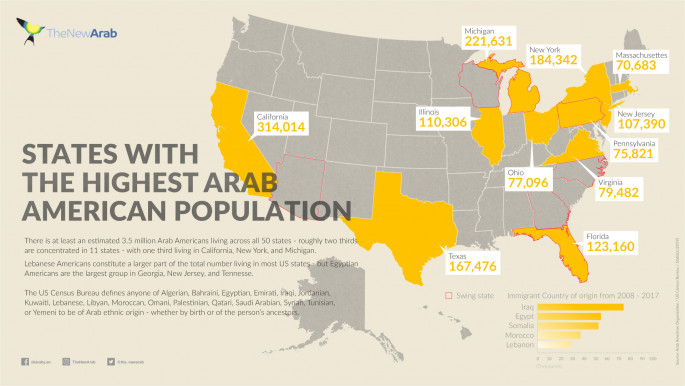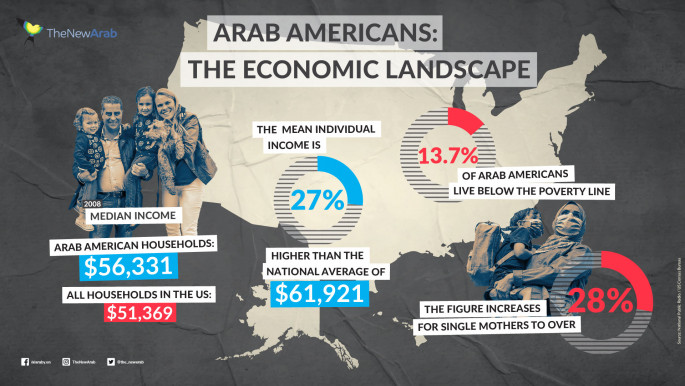Explainer: Why is the Arab American vote so important in the 2020 US election?
How many Arab American voters are there?
While there isn't clear data, there are at least 3.5 million Arab Americans in the United States. Of the total, Lebanese and Syrian Americans constitute the largest bloc, with Yemeni, Palestinian, and Iraqi-Americans making up significant majorities as well.
The largest concentration of Arab Americans is located in Detroit, Michigan. There are sizeable Arab American communities across the US, in California, Florida, Texas, Pennsylvania, Illinois, New York and Virginia, and even Ohio.
During the 2016 presidential election, the Arab American Institute (AAI) poll reported that 91 percent of Arab Americans held voting intentions. In 2020, according to experts, Arab Americans are actively participating in American politics in unprecedented numbers, both as voters and candidates.
Where are Arab American voters most likely to make make a difference?
ABC reports that Arab Americans could play a key role in two swing states: Michigan and Minnesota. The Arab American population in each state - 200,000 and 100,000, respectively - could play a role in determining which candidate picks up the state. Experts have stated that the voting bloc is likely to benefit Democratic candidate and former vice president, Joe Biden.
Arab Americans could also help swing Florida and Ohio, according to some experts.
 |
| Click to enlarge |
What issues matter most to Arab American voters?
Arab Americans are a diverse community and are thus concerned about various social and economic issues, including healthcare, the economy, education, and social security. Additionally, for some, issues of surveillance and discrimination play a role in their decision when it comes to supporting candidates.
Arab Americans are also interested in foreign policy issues, in particular where candidates stand on matters that relate to their ancestral homelands. But a 2016 poll by the Arab American Insitute (AAI) found that the number one issue voters were concerned by remained the economy.
In a 2020 interview, Abed Ayoub, policy director for the American-Arab Anti-Discrimination Committee (ADC) noted that: "Of the Arab [American] community, an overwhelming majority are holding progressive views on a number of policy items that are aligning with the way the country is going". "They're at the forefront of these movements, whether [with regards to] immigration, climate change or healthcare. They're really involved."
 |
| Click to enlarge |
Who do Arab Americans support?
Arab Americans are a very diverse community and should not be viewed as a monolithic voting bloc. Due to varying demographics, cultural backgrounds, and socioeconomic status, Arab Americans do not necessarily fall within one political party.
A 2016 FiveThirtyEight poll found that more Arab Americans identify as Democrat than they do Republican or Independent. Of the 502 participants, 52% self-identified as Democrat, 26% as Republican, and 22% as Independent. Approximately 77% of the Arab Americans who identified as Republican in the same poll from FiveThirtyEight said they also supported Donald Trump.
Before 9/11, the picture was different, as Arabs tended to be more socially conservative and leaned Republican. But after two decades of anti-Arab policies led by Republican administration, there has been a marked shift towards the Democratic party.
However, experts suspect that in the 2020 elections, many Arab Americans will vote against President Trump due to his discriminatory policies both at home, such as the Muslim Ban and wide-ranging immigration restrictions; as well as abroad, including his recognition of Jerusalem as the capital of Israel and continued infringement on the rights of Palestinians, all of which have alienated the community.
Abdalla M. Battah, associate professor of political science at Minnesota State University and an expert in Middle Eastern politics, told ABC News that in 2016, 26% of Arab Americans who voted for Trump gave him the "benefit of [the] doubt."
For the upcoming 2020 election Battah predicts the Biden will benefit in terms of support from the Arab American community as a result of President Trump's failures to "moderate his rhetoric or jettison his racist ideas".
Arab Americans have shown they are not a monolithic voting bloc and generally care about the same issues as other Americans.
Despite making up only about 1% of the US population, it is clear they will play an important role in the upcoming election due to their large numbers in key swing states.
How many Arab and Muslim Americans are running for Congress?
Democrat
Ammar Campa-Najjar, California-50
Rashida Tlaib, Michigan-13
Ilhan Omar, Minnesota-5
Lulu Seikaly, Texas-3
Charlie Crist, Florida-13
Debbie Mucarsel-Powell, Florida-26
Donna Shalala, Florida-27
Qasim Rashid, Virginia-1
André Carson, Indiana-7
Republican
Darrell Issa, California-50
Darin LaHood, Illinois-18
Garret Graves, Louisiana-6
Independent
Iman-Utopia Layjou Bah, Arizona- 2
(If we missed any candidates, please get in touch at editorial-english@alaraby.co.uk)
Mobashra Tazamal is a researcher on Islamophobia at The Bridge Initiative at Georgetown University. Her work has appeared in Al Jazeera, The Independent, Middle East Eye, and AltMuslimah.
Follow her on Twitter:@mobbiemobes







 Follow the Middle East's top stories in English at The New Arab on Google News
Follow the Middle East's top stories in English at The New Arab on Google News


